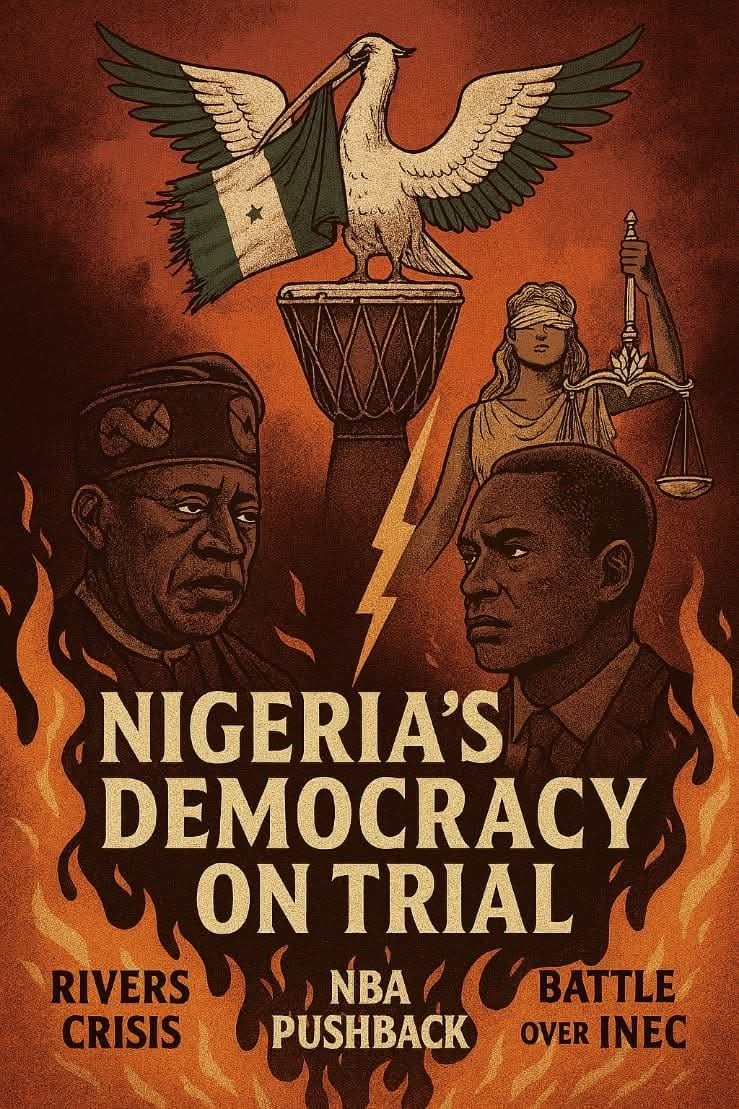
Nigeria’s democracy in 2025 has been subjected to one of its toughest stress tests. Two separate but interconnected developments, the federal government’s emergency rule in Rivers State and the renewed debate over who should appoint the Independent National Electoral Commission (INEC) Chairman have exposed the vulnerabilities and strengths of the country’s political system. Both crises raise fundamental questions about constitutional authority, democratic legitimacy, and the role of civil society in safeguarding Nigeria’s fragile democracy.
On March 18, 2025, President Bola Ahmed Tinubu suspended Governor Siminalayi Fubara, his deputy, and the entire Rivers State legislature, citing escalating political unrest. With the National Assembly’s swift approval, Rivers State was placed under federal control for six months. Although governance was restored on September 18, the damage to citizen trust and democratic stability had already been done.
The constitutional foundation of the proclamation rests on Section 305 of the 1999 Constitution, which empowers the President to declare a state of emergency during war, natural disasters, or threats to national security. Critics argued that a political conflict within a ruling party did not meet this threshold. If partisan disputes can justify emergency rule, then the federal principle enshrined in Nigeria’s constitution becomes dangerously hollow.
Separation of powers was also undermined. Governors and state assemblies derive legitimacy directly from voters, and mechanisms such as impeachment (under Section 188) exist for accountability. By bypassing these safeguards, presidential authority temporarily displaced electoral mandates, creating a precedent future presidents might exploit against dissenting states.
Beyond legality, the immediate governance consequences were stark. Development projects stalled, ministries slowed down, and Rivers residents were left in uncertainty. Federal forces maintained calm around vital oil assets, but the suspension of democratic authority left scars that could outlast the six-month intervention.
The Nigerian Bar Association (NBA) quickly positioned itself as a defender of constitutionalism. NBA President Afam Osigwe condemned the proclamation as a misapplication of Section 305, warning that expedience must never trump the rule of law. The association’s strong language amplified civil society’s unease and signaled that professional groups can still act as checks on executive power.
Yet the NBA’s influence showed limits. It lacks enforcement powers beyond statements, litigation, or mobilizing public opinion. Courts themselves are not immune from political pressures, and civic activism in Nigeria often struggles against state coercion. This revealed the gap between advocacy and enforceable accountability.
Critics also accused the NBA of selective activism, noting inconsistent responses in past instances of federal overreach. Internal debates reflected the tension of balancing professional neutrality with political courage. The NBA’s credibility, therefore, depends on consistency as much as on eloquent condemnation.
Historical parallels underscore the danger. Emergency declarations in Plateau (2004), Ekiti (2006), and Northern Nigeria (2013) were controversial but rarely involved suspending elected officials for intra-party fights. The Rivers case risks normalizing federal intrusion and weakening the principle of subsidiarity that is the backbone of federalism.
The corruption allegations against former Rivers governor Nyesom Wike added another dimension. Reports of hidden U.S. properties and illicit funds raised questions about integrity in public office. If verified, such allegations demand transparent investigation, both domestically by bodies like the Code of Conduct Bureau and internationally through treaty-based cooperation.
Civil society’s role in exposing corruption is vital. Past examples, such as the resignation of Finance Minister Kemi Adeosun over certificate forgery, showed that organized pressure can force accountability. The Wike saga now tests whether advocacy groups can sustain similar vigilance amid political fatigue and polarization.
Meanwhile, attention shifted to electoral reform as the debate over who should appoint INEC’s Chairman resurfaced ahead of the 2027 elections. Section 154 of the Constitution grants the President nomination powers, subject to Senate confirmation and Council of State advice. While legally correct, critics argue this framework undermines independence in a system where the executive dominates both legislature and politics.
Defenders of the status quo cite history, Obasanjo, Jonathan, and Buhari all appointed INEC heads. But history also reminds Nigerians of controversial elections in 2003, 2007, 2019, and 2023, contests tainted by allegations of rigging and poor technology management. Legality aside, many citizens doubt whether executive-led appointments can ever inspire confidence.
The presidency’s dismissive tone toward critics, branding them “ignorant” or “wailers” further alienates citizens, particularly young, tech-savvy Nigerians who drove movements like #EndSARS. Public trust in INEC already hit record lows in 2023, with turnout falling below 30%. Restoring legitimacy requires humility, transparency, and genuine reform, not rhetorical combat.
Taken together, the Rivers emergency, NBA’s limited pushback, corruption allegations, and the INEC appointment controversy all converge on a central theme, Nigeria’s democracy remains vulnerable to executive overreach, weak institutions, and public distrust. The path forward lies not just in constitutional text but in civic vigilance, professional consistency, and political restraint. If these lessons are ignored, legality may remain intact, but legitimacy, the lifeblood of democracy, will continue to erode.
©️ Adebamiwa Olugbenga Michael
Do you want to advertise with us?
Do you need publicity for a product, service, or event?
Contact us on WhatsApp +2348033617468, +234 816 612 1513, +234 703 010 7174
or Email: validviewnetwork@gmail.com
CLICK TO JOIN OUR WHATSAPP GROUP





